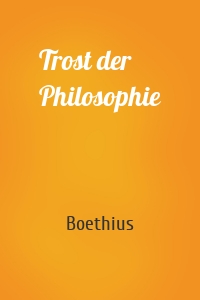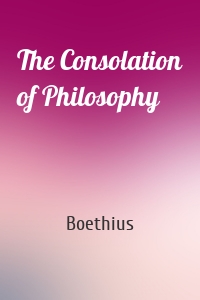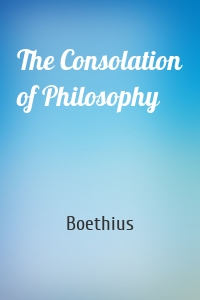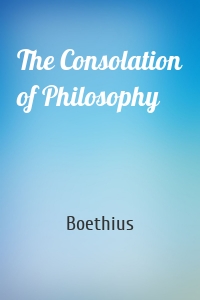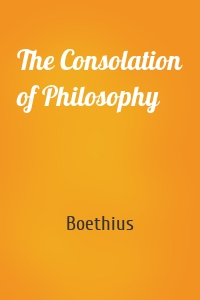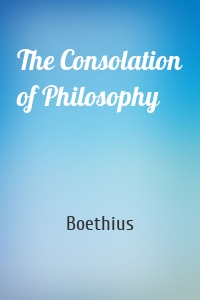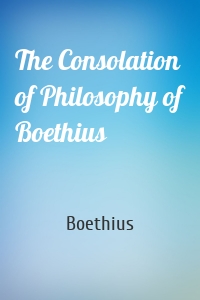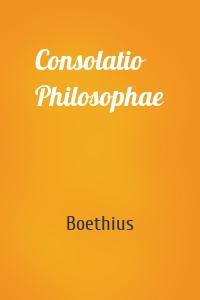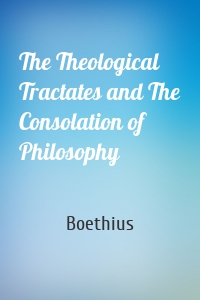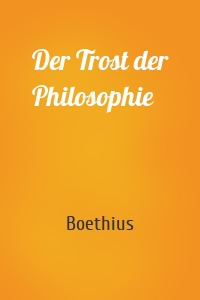Boethius
10 кн.
Trost der Philosophie
Mit seinem Hauptwerk Trost der Philosophie (Consolatio philosophiae) schuf Boëthius eines der letzten bedeutendsten philosophischen Werke der Spätantike. Es entstand im Jahr 524 und ist einer der wichtigsten Texte der frühchristlichen Philosophie und Theologie, das großen Einfluss auf die spätere Scholastik ausübte. Boëthius verfasste das Werk, während er im Gefängnis saß und auf seine Hinrichtung wartete. Das Buch erzählt, wie ihm in dieser Situation die allegorische Gestalt der Philosophie...
| Автор | Boethius |
The Consolation of Philosophy
Consolation of Philosophy (Latin: Consolatio Philosophiae) is a philosophical work by Boethius, written around the year 524. It has been described as the single most important and influential work in the West on Medieval and early Renaissance Christianity, and is also the last great Western work of the Classical Period. Anicius Manlius Severinus Boëthius, commonly called Boethius (c. 480–524 or 525 AD), was a philosopher of the early 6th century. He was born in Rome to an ancient and prominent...
| Автор | Boethius |
The Consolation of Philosophy
Born in the late 5th century AD, Boethius was a Roman statesman and philosopher who would come into the service of the Ostrogothic ruler of Italy, Theodoric the Great. Ultimately he would rise to the position of magister officiorum, the head of all the government and court services. In 523 AD he would find himself accused of treasonous correspondence with Justin I, a charge that would land him in prison and ultimately lead to his execution. During Boethius’s year-long imprisonment leading up to...
| Автор | Boethius |
The Consolation of Philosophy
Boethius's «Consolation of Philosophy» is considered one of the most important and influential works of medieval times. Written during Boethius's year-long imprisonment for treason which would ultimately lead to his torturous execution, «Consolation of Philosophy» is a classical exposition of human nature as Boethius reflects on the treacherous betrayal by his friends that led to his fall from favor with his lord. Presented here in this volume is H. F. Stewart's translation of...
| Автор | Boethius |
The Consolation of Philosophy
One of the most influential books in the history of Western thought, The Consolation of Philosophy was written in a prison cell by a condemned man. Anicius Manlius Severinus Boethius (c. 480–524) was a Roman scholar, theologian, philosopher, and statesman. Imprisoned by the Ostrogothic king Theodoric, probably on trumped-up subversion charges, he was thrown into a remote prison where he was eventually executed.While awaiting his fate, he wrote this dialogue in alternating prose and...
| Автор | Boethius |
Consolatio Philosophae
Lateinische Ausgabe. 'Der Trost der Philosophie' (lateinisch Consolatio philosophiae) ist das bekannteste und wichtigste Werk des römischen Philosophen Boethius und anerkanntermaßen auch das bedeutendste philosophische Werk der Antike. Die fünf Bücher verstehen sich als Dialog zwischen dem Autor und der personifizierten Philosophie, die ihn tröstet und belehrt. Dabei schöpft Boethius sein Gedankengut vor allem aus den Werken Platons, des Aristoteles und der Neuplatoniker.
| Автор | Boethius |
The Theological Tractates and The C...
Boethius's «Consolation of Philosophy» is considered one of the most important and influential works of medieval times. Written during Boethius's year-long imprisonment for treason which would ultimately lead to his torturous execution, «Consolation of Philosophy» is a classical exposition of human nature as Boethius reflects on the treacherous betrayal by his friends that led to his fall from favor with his lord. Presented here in this volume is H. F. Stewart's translation of...
| Автор | Boethius |
Der Trost der Philosophie
Boethius' bekanntestes Werk ist der «Trost der Philosophie», (oder «Tröstungen der Philosophie»), das er während seiner Gefangenschaft schrieb – «das bei weitem interessanteste Beispiel von Gefängnisliteratur, das die Welt je gesehen hat.» Es ist ein Dialog zwischen der Philosophie und Boethius, in dem die Königin der Wissenschaften versucht, den gefallenen Staatsmann zu trösten. Das Hauptargument des Diskurses ist die Vergänglichkeit und Unwirklichkeit aller irdischen Größe und das höhere...
| Автор | Boethius |


